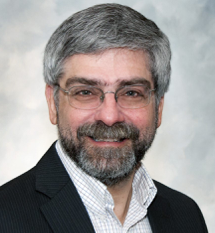Dr. Richard E. Carson
Professor of Radiology and Biomedical Imaging and of Biomedical Engineering. Director, Yale PET Center
Lectures
Quantitative Strategies for PET Imaging: Challenges and Opportunities
Positron Emission Tomography (PET) imaging allows the production of high resolution images of radiopharmaceutical distribution in humans and animals. With the use of appropriate targeted radioactive molecules combined with tracer kinetic modeling, a myriad of physiological and pharmacologic parameters can be assayed in vivo. This presentation will review modern PET quantitative techniques for image analysis and statistical methods. Examples where results can be misleading without use of full quantification are presented. Recent, novel and cutting-edge methods including direct reconstruction of parametric images are also shown.
PET Imaging in Oncology: Novel methods and algorithms
Emission Tomography (PET) imaging is widely used in cancer for diagnosis, tumor staging, and treatment monitoring. Most PET imaging in cancer is performed with the glucose analog FDG, using simple acquisitions and quantification based on standardized uptake values (SUV). This presentation provides new directions for cancer imaging. Improved image quality with continuous non-rigid corrections for respiratory and body motion are shown. Dynamic, model-based analysis with FDG is shown, which has the promise of increased sensitivity and accuracy for tum or detection and monitoring. These data can be improved further with direct reconstruction of parametric images. The use of other radiopharmaceuticals for cancer opens the opportunity of assaying a broader range of cancer-related biology including hypoxia, assays of drug delivery to tumors with labeled agents, and imaging studies to complement immunotherapy.
About

Richard E. Carson is Professor of Biomedical Engineering and of Radiology and Biomedical Imaging at Yale University and Director of the Yale PET Center. His research focus includes development of mathematical models for novel PET radiopharmaceuticals and applications of PET tracers in clinical populations and preclinical models of disease, with specific focus on neuropsychiatric disorders. Dr. Carson has published over 275 papers, given over 125 invited lectures and has received numerous awards including the Kuhl-Lassen award and the Edward J. Hoffman Award from the Society of Nuclear Medicine, the Distinguished Investigator Award from the Academy of Radiology Research, and the Edward J. Hoffman Award for Medical Imaging from the IEEE.